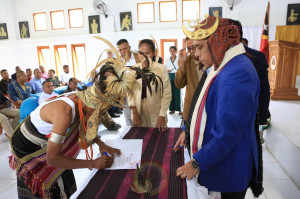Minister of State Administration monitors the strengthening of local governance in the municipalities of Aileu, Manufahi and Viqueque

The Minister of State Administration, Tomás do Rosário Cabral, concluded a week's work in the municipalities of Aileu, Manufahi and Viqueque, where he presided over various ceremonies to swear in the heads of villages and monitored the progress of important works to strengthen local governance.
In Viqueque, the Minister inaugurated the new administration building at the Ossu Administrative Post, accompanied by the President of the Municipal Authority, Francisco Cruz Simões de Gonzaga Soares. On the occasion, he highlighted the importance of the new building in bringing public services closer to the population and called for trees to be planted on the site to prevent soil erosion. He also stressed the need to restore the old administration building, classified as heritage from the Portuguese colonial period. “That place belongs to all of us and to the state, to serve this Administrative Unit, so that people can access services more easily and services are closer to the population,” he said.
During his visit to Ossú, the Minister also saw the site of the future Our Lady of the Queen of the Rosary Chapel, under construction with funding from the National Villages Development Program (PNDS Portuguese acronyms), with a budget of 62,000 dollars for the 2024 financial year. He also visited the work on the Mary Help of Christians Chapel in Builo Village, highlighting the importance of these spaces as religious and community centers that strengthen the social fabric in rural and remote areas.
Also in Viqueque, Tomás do Rosário Cabral officially inaugurated the residence of the President of the Municipal Authority, located at the Viqueque Vila Administrative Post, and presided over the swearing-in ceremonies for the heads of Macadique de Baixo village and Macadique Uaitame, at the Uatulari Administrative Post. At the same event, computers and official photographs of the sovereign bodies were distributed to the new leaders, as a form of institutional support for the start of their terms in office.
During the ceremony, the Minister reaffirmed the government's commitment to administrative and political decentralization, noting that “the government has approved a resolution so that, after the 2027 presidential election, there can be local government with a permanent budget and political rights, so that public services are closer to the population and decisions don't depend exclusively on the center”.
In the municipality of Aileu, the Minister observed the land for the future One-Stop Shop building, accompanied by the President of the Municipal Authority, João Bosco dos Santos. He stressed that this public service center aims to provide services in an efficient, transparent and accessible way, strengthening local administrative capacity. Also in Aileu, he presided over the swearing-in ceremony of the Villages’s chiefs of Karahili and Hurai-Raco, together with the Secretaries of State for Local Development and Vocational Training and Employment. The Minister urged the new leaders to honor their commitment to their communities, stressing that “the people expect solutions and leadership from you to promote the common good and development with stability and peace”.
In Manufahi, on March 25th, the Minister presided over the swearing-in of the head of Village of Tahu-Bein, at the Alas Administrative Post, accompanied by the President of the Municipal Authority, Luís Marçal da Costa Tavares. In his speech, he stressed the importance of a functional and well-organized local government, reiterating that “local administration is only effective when it is articulated with municipal services and supported by a central structure committed to development”.
Throughout the week, the ceremonies were attended by government representatives, religious and traditional authorities, heads of municipal services, security forces, members of civil society and the local community, demonstrating their joint involvement in consolidating local power and decentralization in Timor-Leste.










































